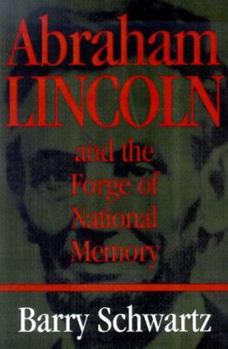Abraham Lincoln and the Forge of National Memory
Select Format
Select Condition 
Book Overview
Abraham Lincoln has long dominated the pantheon of American presidents. From his lavish memorial in Washington and immortalization on Mount Rushmore, one might assume he was a national hero rather... This description may be from another edition of this product.
Format:Hardcover
Language:English
ISBN:0226741974
ISBN13:9780226741970
Release Date:July 2000
Publisher:University of Chicago Press
Length:382 Pages
Weight:1.75 lbs.
Dimensions:1.3" x 6.3" x 9.3"
Customer Reviews
1 rating
Legacy: A Product or Culture, Time, and Context
Published by Thriftbooks.com User , 14 years ago
Barry Schwartz, in Abraham Lincoln and the Forge of National History, argues that the legacy of Abraham Lincoln is transformed, is a product of culture, and dependent on time and situation (Schwartz, Abraham Lincoln and the Forge of National History xi). Schwartz undertakes this project through a discourse analysis. He examines the archive of newspaper articles, prints, paintings, statues, sermons, and speeches. Schwartz's theoretical intervention vis-à-vis Levine is that history is not limited to opening up the same to radical ways of thinking. Schwartz goes beyond Gary Nash, et al's argument that history and commemoration are subject to ideological clashes. Finally, he extends Rosenzweig and Thelen argument that history and commemoration are both subject to the contingency of place. Schwartz does argue that Lincoln's commemoration (as a stand in for history and commemoration) is contingent on context (Schwartz, Abraham Lincoln and the Forge of National History xii). Schwartz's project is important in the discussion of public history vis-à-vis the three other books cited above because it extends the contestation of history and commemoration to include historical context. Schwartz addresses and carefully cites all the important positions en route to this macro argument relating to memory and history. Schwartz argues that the common sense understanding of Lincoln changed over historic time contingent to the transformation of national interests and priorities. First, in the Progressive era, Lincoln is the "common man" who from his "humble" birth in a log cabin rose to prominence and fame all the way to the White House -- despite the odds. Conversely, in the mid-20th-century, during the apex of the civil rights era, Lincoln is venerated as the "Great Emancipator" (Schwartz, Abraham Lincoln and the Forge of National History 84 and 89). According to Schwartz, "Lincoln, symbolizes Durkheim's benefactors, became America's universal man: changing and remaining the same; standing beside the people and above the people; a reflection of and model of them - at once behind, above, and within them" (Schwartz, Abraham Lincoln and the Forge of National History 312). In the end, this project focuses on the transformation of Lincoln as a man to one of symbol. It was not, historical discoveries that elevated Lincoln's standing. According to Schwartz, it was "cultural" and I would add "temporal" forces that made Lincoln into as Schwartz argues a "national deity" (Schwartz, Abraham Lincoln and the Forge of National History xi). Lincoln, Schwartz moreover contends, took on a dual image of the "plainness, familiarity, and sympathy" of the common person, concurrently taking on the image "stateliness, authority, and dignity" of the state (Schwartz, Abraham Lincoln and the Forge of National History 256). Lincoln, in the end, became "part of the soul of American society" (Schwartz, Abraham Lincoln and the Forge of National History 255). Schwartz is very interested in the




